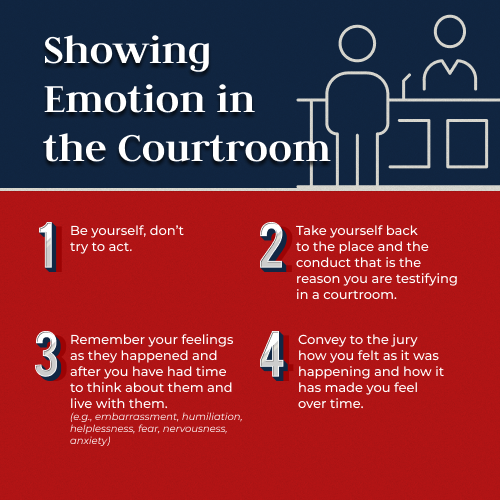Can a victim show emotion in the courtroom? Yes, victims can express their emotions, but it’s important to balance authenticity with the formal decorum expected in a courtroom setting. The courtroom is a serious and formal place, but the matters litigated within a courtroom’s walls are often upsetting and highly emotional. So, if you are the victim of mistreatment, how do you handle emotion in the courtroom? In general, you do not need to turn off your genuine emotions when you cross the threshold of a tribunal, but you do need to exercise caution about how you display your feelings.
When you are seeking justice against the misconduct of another, hiring an experienced attorney is vital to present your case before judges and juries effectively. John Dalton has been in practice for over two decades, and his advocacy is guided by great skill and compassion for his clients.

Be Honest
Whatever emotions you display in a legal proceeding, they must be honest. Your credibility is vital to the success of your case, so do not drum up feelings that do not exist in hopes of gaining sympathy from a judge, arbitrator, or jury.
Be Mindful of Your Emotional Responses, Even When You Are Not Testifying
Judges and juries watch you not only when you are on the witness stand but also when you observe the proceedings. If your demeanor when you are not testifying does not match your behavior during your testimony, the court might be less likely to believe you. And if you engage in disruptive outbursts when it is not your turn to speak, you might lose supporters in the jury box or on the judge’s bench. Emotional struggles are expected when you are the victim of poor treatment, so you should quietly speak to your attorney about the need to take a recess or leave the courtroom when you feel overwhelmed.
Regardless of What You Feel, Make Sure Your Testimony Is Clear
We call judges, arbitrators, and juries factfinders in the legal world. The primary purpose of a judge or jury during a trial is to find the facts that they can use to come to a legal conclusion about a case. And in a trial against someone who has harmed you, the purpose of your testimony is to provide the judge or jury with credible evidence about the defendant’s misconduct.
Showing emotion on the witness stand is important and honest, but the facts of your case can be hard to convey to others if you let the emotion overwhelm you. To strike the appropriate balance between what you are feeling and how to communicate your case’s circumstances effectively, speak to a skilled lawyer. Going over your testimony with a lawyer can help you focus on the facts you need to highlight while giving yourself the space to express your emotions.
Is It Okay to Cry in Court?
Yes, it is okay to cry in court. A whole category of legal damages is calculated by quantifying a victim’s pain and suffering, so why wouldn’t you let a judge or jury know when you are sad?
If the harm you have suffered has caused you sadness, anguish, or pain, you should let the courtroom know through your words and your demeanor. In fact, research has shown that victim-witnesses who express “an acceptable level” of sadness or distress on the stand are perceived as more credible than witnesses who do not display emotions. And what is an acceptable level of sadness? It is what you honestly feel because honesty is always the best policy in the courtroom.
Be Careful with Expressions of Anger
Whether you are a sexual assault victim or a victim of employment discrimination, your anger toward your abuser or employer is understandable. However, anger is a tricky emotion to convey in a legal proceeding. A recent report noted that judges often feel anger is unacceptable and unproductive in the courtroom. You can share your anger in court, but you must be cautious.
A Defendant Can Use Your Anger Against You
Remember that your righteous anger toward the mistreatment you have endured is more vulnerable to a defendant’s dishonest spin than your sadness is. Many defendants in assault and discrimination cases try to dismiss a victim’s valid claims by arguing that the victim is fabricating stories for revenge purposes. If you cannot minimize your displays of anger while testifying, a factfinder might be more prone to believe an abuser’s or harasser’s dismissive defenses.
Dealing with Your Anger in Court
So, how do you handle anger when you are in the throes of litigation? Discuss your feelings with your lawyer and talk to them about the concerns you have about appearing too angry or too emotional during proceedings. It is OK to be angry about the mistreatment you have suffered. But it is also important to keep your anger under control so you can properly communicate to the judge and/or jury through your testimony.
A Good Advocate Can Be Your Emotional Support
A skilled attorney knows that resolving your legal dispute cannot be all about statutes and closing arguments. Great advocacy includes addressing a client’s emotional needs, and John Dalton has decades of experience successfully protecting his client’s legal interests and emotional well-being.
John Dalton is also a record-setting attorney, winning some of the largest verdicts in the State of California. The Law Offices of John Dalton can deliver if you seek top-level legal representation and compassionate guidance.
Act Now – Contact an Experienced California Attorney
Please call us or contact us online for a free consultation.

